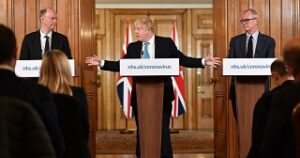Stark food for thought on the radio
Shortly before I rose from my bed overnight I was listening to the Stephen Nolan Show (2200 hours to 0100 hours) on Radio Five Live leading up to 1.00am.
 He was interviewing a gentleman whose name I did not catch and may (or may not) have been a Kiwi but – as far as I could tell from the conversation – seems to have been one of the medics/scientists involved in the devising of and/or implementation of New Zealand’s response to the Covid-19 pandemic.
He was interviewing a gentleman whose name I did not catch and may (or may not) have been a Kiwi but – as far as I could tell from the conversation – seems to have been one of the medics/scientists involved in the devising of and/or implementation of New Zealand’s response to the Covid-19 pandemic.
He was neither a rabble-rouser, nor a boastful type, and made his points in an understated manner.
 What stood out about them for me was that they not only seemed logical but – here attempting to do my best not to shoot from a “Captain Hindsight” hip – one by one, inexorably built a compelling argument by implication (said gent never once criticised the UK Government) that the UK’s performance in dealing with the virus had been uniformly inconsistent, cack-handed, ill-thought through and badly (if not negligently) implemented.
What stood out about them for me was that they not only seemed logical but – here attempting to do my best not to shoot from a “Captain Hindsight” hip – one by one, inexorably built a compelling argument by implication (said gent never once criticised the UK Government) that the UK’s performance in dealing with the virus had been uniformly inconsistent, cack-handed, ill-thought through and badly (if not negligently) implemented.
Without any doubt the theme running through the middle of the proverbial stick of rock was ‘lack of leadership’.
 The impression that the UK Government – notwithstanding any good intentions and “all hands to the pumps” efforts – was incapable of designing a proper strategy, explaining same to the public and then implementing it was inescapable.
The impression that the UK Government – notwithstanding any good intentions and “all hands to the pumps” efforts – was incapable of designing a proper strategy, explaining same to the public and then implementing it was inescapable.
Instead, burdened with the considerable weight of “knowledgeable opinion” from all sides and disciplines, plus lobbying groups on behalf of the NHS, Business, and indeed Uncle Tom Cobley and all banging daily upon their doors, the Government operated exclusively upon a short-term basis in responding to developments which (inevitably) led to confusion, U-turns and ultimately mass cynicism from large swathes of the public including myself.
 In wishing “to do the right thing” by everyone – and simultaneously trying to avoid offending anyone or group – ironically the Government ultimately managed to unite the country.
In wishing “to do the right thing” by everyone – and simultaneously trying to avoid offending anyone or group – ironically the Government ultimately managed to unite the country.
North or South, wealthy or deprived and irrespective of political allegiance, to a degree we (the general public) lost respect for our lords and masters.
(To coin an appropriate phrase encapsulating the thrust, try re-arranging the words “whelk stall” … “run” … “they” and “couldn’t”).
 Stephen Nolan’s guest’s main points were as follows:-
Stephen Nolan’s guest’s main points were as follows:-
(1)
In dealing with a virus pandemic of the nature of Covid-19 , the key – the only – goal is to stop transmission from person to person.
The virus exists only to perpetuate itself and, if it cannot transmit from person to person, it dies.
(2)
 So how do you stop transmission?
So how do you stop transmission?
Firstly, you close down your country to stop people (of all nationalities including your own) coming in because each (any) of them may be carrying – or capable of transmitting – the virus.
And the harder you close down your borders the more effective the move will be.
Secondly, you must have – or alternatively you must devise – a cast-iron, technically-impregnable, fully efficient and working, “track and trace” system.

Kiwi rugby resumes
Then, whenever any “positive” virus test result arises, you must immediately “run it down” by tracing everyone the person with the “positive” test result has been in contact with and force them into isolation.
And thirdly, you must have series of clear, straightforward and simple messages for your population – together with the back-up reasoning for any measures being taken by the Government from time to time.
(3)
Some lobby groups seem to misunderstand this – or perhaps deliberately out of self-interest choose to ignore it – but the “establishing/preserving public health” principle is the absolute imperative.
 Both history and worldwide developments/practice during the course of the global Covid-19 pandemic have proved conclusively that the simplest and quickest path back to national economic prosperity for any/all countries is to “sort” the public health problem first.
Both history and worldwide developments/practice during the course of the global Covid-19 pandemic have proved conclusively that the simplest and quickest path back to national economic prosperity for any/all countries is to “sort” the public health problem first.
It has never been the case – as some Tory MPs and others seem to have been arguing consistently almost since the beginning of the crisis in the UK – that it is a matter of “one or the other” … and that, ultimately, the interests of the economy must prevail.
POSTSCRIPT
As I mentioned earlier in this piece, the interviewee’s points seemed to make a great deal of sense to me.
This was compounded by his exchange with Stephen Nolan as the interview drew to its conclusion.
Nolan asked how many deaths in total due to Covid-19 New Zealand had suffered so far. The answer came back: “25”.
Nolan then extrapolated this (in percentage of population terms) to the UK … and came up with the answer “345”.
Note:
Up to Friday 5th February the official number of UK deaths occurring within 28 days of an individual testing positive for Covid-19 has reached 111,264.
According to ITV, separate figures from UK statistical agencies suggest that – when all deaths where Covid-19 has been mentioned on the death certificate, together with deaths that have occurred in recent days but which have not yet reached the official count (see above) – the total number of deaths in the UK now exceeds 128,000.

